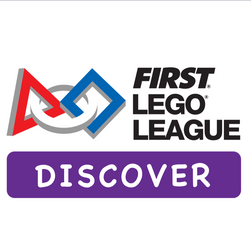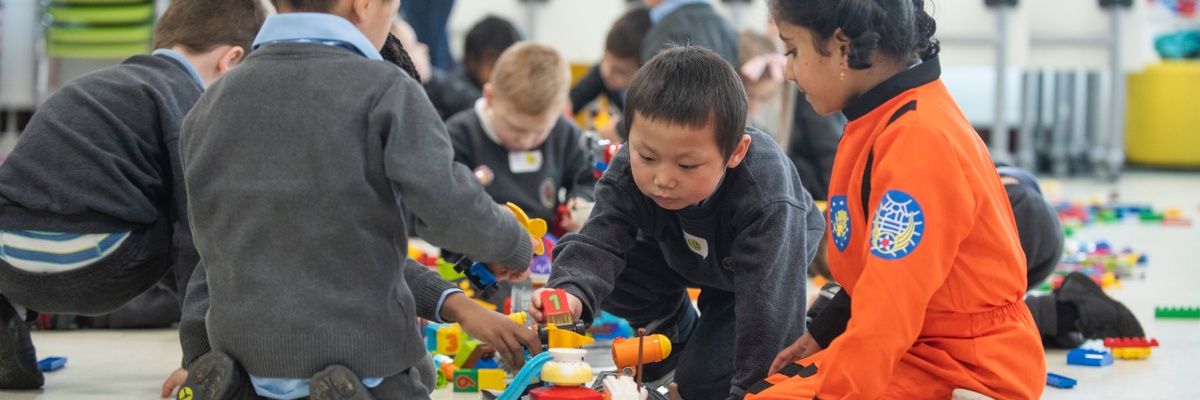

The Programme
FIRST® LEGO® League shows young people what it means to be an engineer and work with STEM skills and subjects, but focuses on practical, hand-on learning, so they are doing, not watching. FIRST® LEGO® League Discover is designed for 4-6 year-olds and develops children’s STEM skills from an early age. Delivered in school by the class teacher, children work in groups of four to explore a real-world theme with an exclusive LEGO® Discover model. Using this model as a starting point, they design and build new models of their own with LEGO® STEAM Park bricks. Working through a series of tasks and challenges, the programme finishes with a celebration event to recognise the children’s achievements.
As they work, they develop valuable habits of learning, such as persisting with tasks and applying previous knowledge to new situations. Throughout their experience, teams operate under the FIRST® LEGO® League core values, celebrating discovery and teamwork, all while having fun! Skills are also developed at home with the Discover More set: a take-home resource consisting of two sets of DUPLO® Six Bricks to continue learning at home with parents and carers.
Children get the chance to showcase their learning journey at the end of the programme with a Celebration Event, which involves building, a special challenge and talking about what they have learnt with parents and other adults. Their hard work and perseverance are celebrated with a certificate and lots of high fives!
What you can do
Teachers are fully supported with comprehensive resources available to download on the IET Teacher Resources webpage, including image banks to use within sessions, session and training videos, and curriculum grids.
You can sign up here, and if you're in a location with funding, complete the 30 Day Challenge to get grant funding to cover all the costs associated with delivering the programme in your school. The team at Learnit (Ireland) or the IET (UK) will support you through the process.
The Programme
FIRST® LEGO® League shows young people what it means to be an engineer and work with STEM skills and subjects, but focuses on practical, hand-on learning, so they are doing, not watching. FIRST® LEGO® League Discover is designed for 4-6 year-olds and develops children’s STEM skills from an early age. Delivered in school by the class teacher, children work in groups of four to explore a real-world theme with an exclusive LEGO® Discover model. Using this model as a starting point, they design and build new models of their own with LEGO® STEAM Park bricks. Working through a series of tasks and challenges, the programme finishes with a celebration event to recognise the children’s achievements.
As they work, they develop valuable habits of learning, such as persisting with tasks and applying previous knowledge to new situations. Throughout their experience, teams operate under the FIRST® LEGO® League core values, celebrating discovery and teamwork, all while having fun! Skills are also developed at home with the Discover More set: a take-home resource consisting of two sets of DUPLO® Six Bricks to continue learning at home with parents and carers.
Children get the chance to showcase their learning journey at the end of the programme with a Celebration Event, which involves building, a special challenge and talking about what they have learnt with parents and other adults. Their hard work and perseverance are celebrated with a certificate and lots of high fives!
What you can do
Teachers are fully supported with comprehensive resources available to download on the IET Teacher Resources webpage, including image banks to use within sessions, session and training videos, and curriculum grids.
You can sign up here, and if you're in a location with funding, complete the 30 Day Challenge to get grant funding to cover all the costs associated with delivering the programme in your school. The team at Learnit (Ireland) or the IET (UK) will support you through the process.
So our goal in running this project was to focus on language development in a Junior Infant class. Our school has a very high percentage of EAL students and in the class that took part, 2 of 25 had English as a first language.
We ran the programme in 2 forms. One was following the structured programme listed in the book. We followed an adapted version of the lessons as we felt the level of some tasks was slightly higher than our ability. We ran with the theme of energy in other aspects of the curriculum to enable the children to better engage with the topic.
Each session ended with the children presenting their work, keeping their presentation focused on what our target for that day was. We focused on a collaborative approach with children sharing ideas with each other for improving their work.
At the end we invited parents to join us in the classroom for the final project but unfortunately there was no uptake from parents so we completed this task and presented our work to another class instead.
The second part of our Lego project was the use of 6 bricks to develop the children's language. We opened all activities with a short one from the programme but we also began using other table mats and suggested activities for using 6 bricks linked to our Aistear themes during play. We especially noticed a big impact on aural comprehension and instructional language.
The funding we received covered the cost to run the full programme last year and will be run again by both our new junior infant classes. It also enabled us to have a 6 bricks set for each child in both classes which will be used much earlier in Junior Infants than before. This is because we have been able to witness the benefits that it brings in such a short period of time.
The lego was also used throughout our thematic teaching. While learning about the supermarket the children would build shops, shelving etc using the lego for their small world play. This inspired imaginative play and also helped the teachers develop the language through the play by offering challenges or creating dramatic scenes for the children to act out.
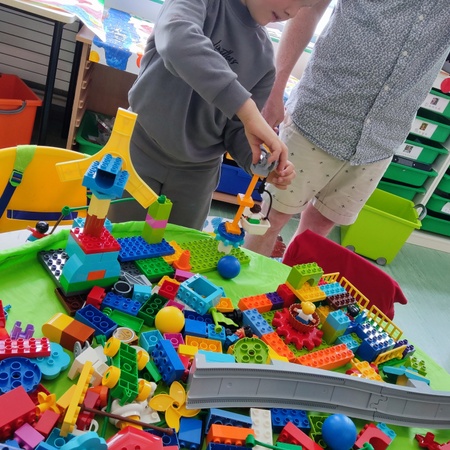
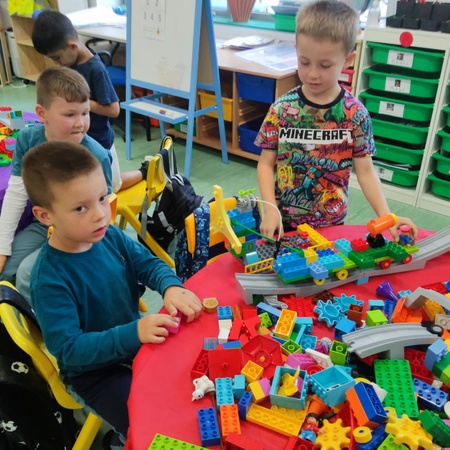
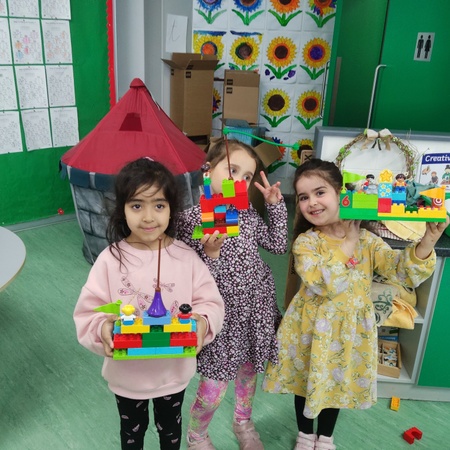

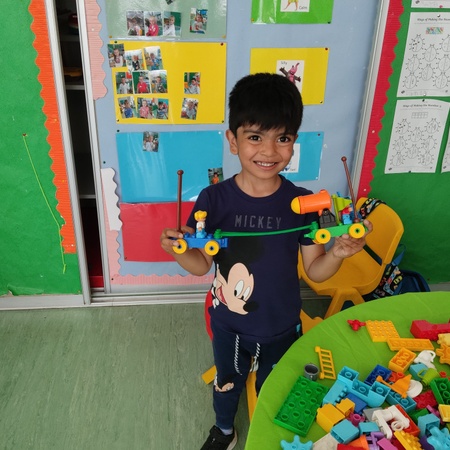
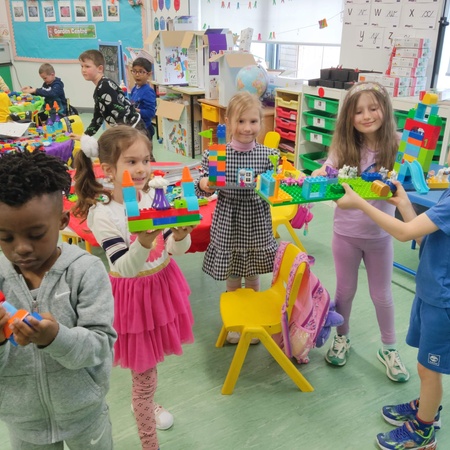
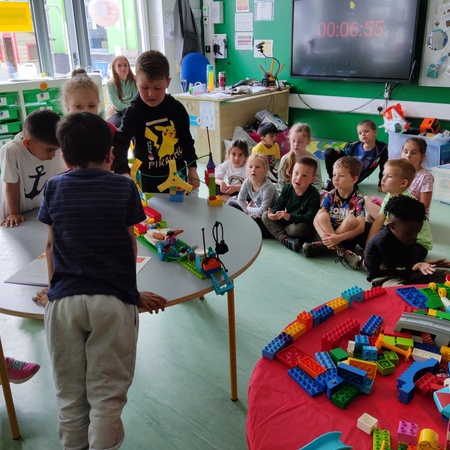
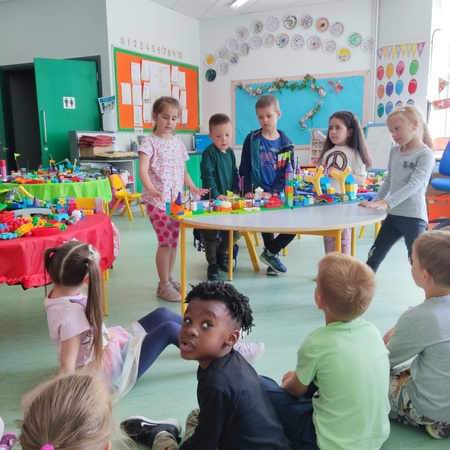
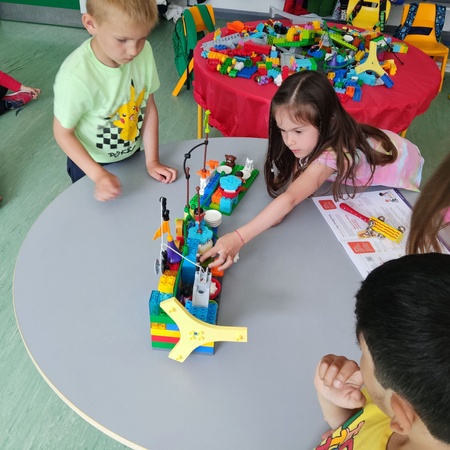
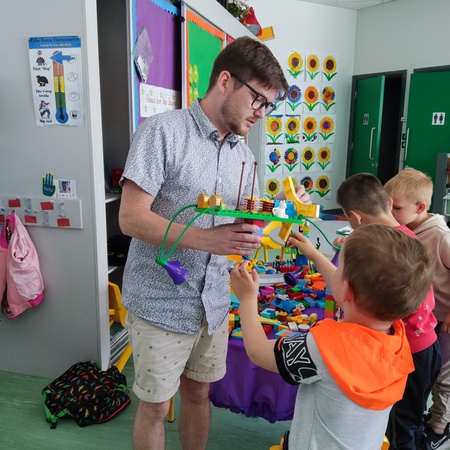
So our goal in running this project was to focus on language development in a Junior Infant class. Our school has a very high percentage of EAL students and in the class that took part, 2 of 25 had English as a first language.
We ran the programme in 2 forms. One was following the structured programme listed in the book. We followed an adapted version of the lessons as we felt the level of some tasks was slightly higher than our ability. We ran with the theme of energy in other aspects of the curriculum to enable the children to better engage with the topic.
Each session ended with the children presenting their work, keeping their presentation focused on what our target for that day was. We focused on a collaborative approach with children sharing ideas with each other for improving their work.
At the end we invited parents to join us in the classroom for the final project but unfortunately there was no uptake from parents so we completed this task and presented our work to another class instead.
The second part of our Lego project was the use of 6 bricks to develop the children's language. We opened all activities with a short one from the programme but we also began using other table mats and suggested activities for using 6 bricks linked to our Aistear themes during play. We especially noticed a big impact on aural comprehension and instructional language.
The funding we received covered the cost to run the full programme last year and will be run again by both our new junior infant classes. It also enabled us to have a 6 bricks set for each child in both classes which will be used much earlier in Junior Infants than before. This is because we have been able to witness the benefits that it brings in such a short period of time.
The lego was also used throughout our thematic teaching. While learning about the supermarket the children would build shops, shelving etc using the lego for their small world play. This inspired imaginative play and also helped the teachers develop the language through the play by offering challenges or creating dramatic scenes for the children to act out.
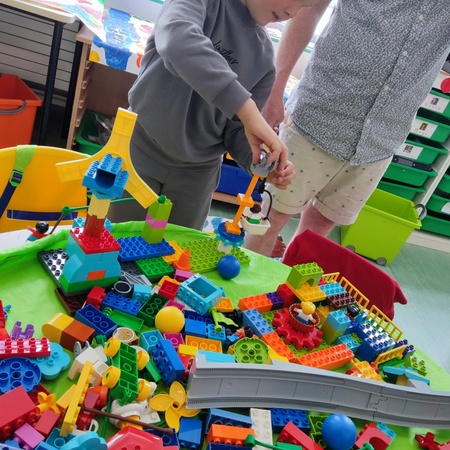

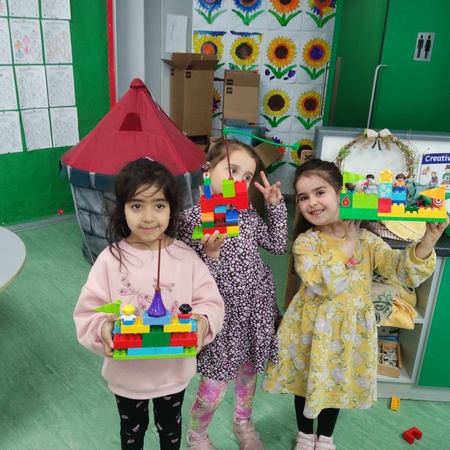
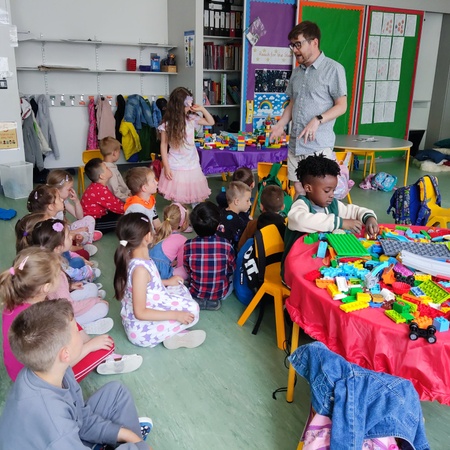
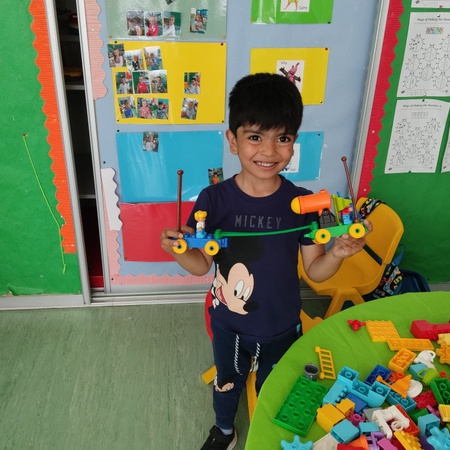
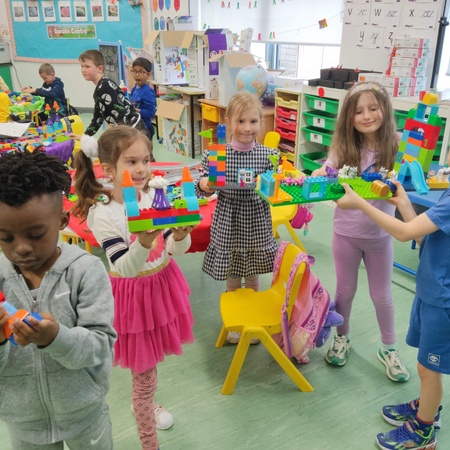
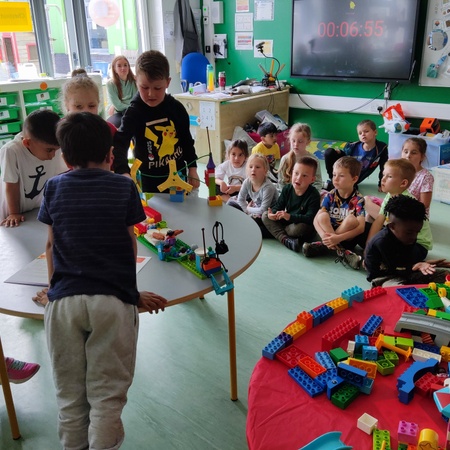
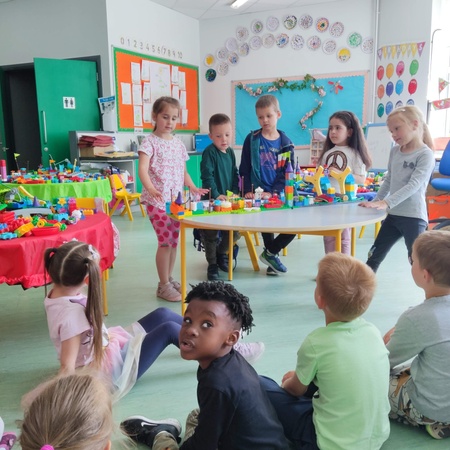
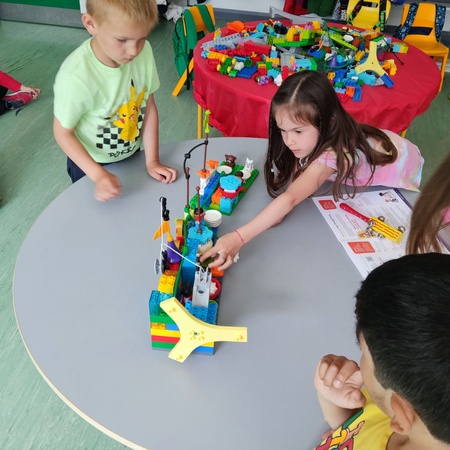
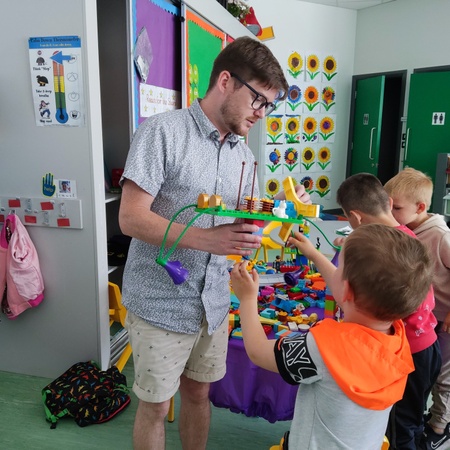
We hope to use this project to help develop our pupils language (high % of EAL in our school). We also aim to help develop their imagination and social/play skills. All which were significantly impacted by preschool & creche closures during the covid 19 pandemic.
